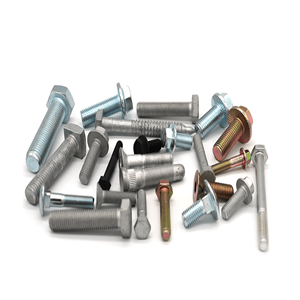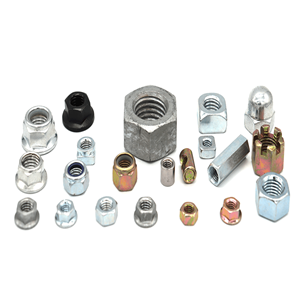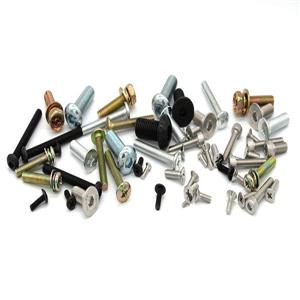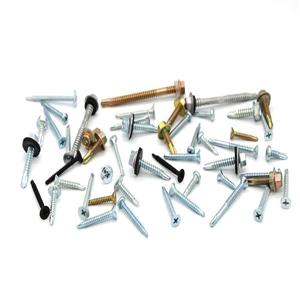The development status of titanium alloy for aviation fastener is introduced
Titanium alloy fasteners are widely used in aerospace because of their low density, high specific strength and corrosion resistance. The development status of titanium alloy materials for aviation fasteners is reviewed. Combined with the development of titanium alloy for fasteners, the application status of titanium alloy for fasteners at home and abroad is introduced, and the performance characteristics of titanium alloy materials for fasteners are compared and analyzed. At the same time, combined with the requirements of advanced aircraft for high-performance fasteners, several high-strength and toughness titanium alloy materials for fasteners and their fastener processing technology are introduced.
Bolts, studs, screws, nuts, washers, pins, rivets and other fasteners are widely used in aircraft. The number of fasteners and elastic elements used in an aircraft is as small as several hundred thousand, and as many as several million. For example, the number of fasteners used in a Russian il-96 aircraft is 142000, that of a single aerial passenger A380 is more than 1 million, and that of Boeing 787 is more than 1 million There have been incidents of delayed delivery due to shortage of fasteners. With the improvement of aircraft's advanced nature, the requirements for fastener materials are getting higher and higher. Titanium alloy with high weight loss, corrosion resistance, non-magnetic properties and good compatibility with composites has become the first choice for advanced aircraft fastener materials. Titanium alloy fasteners are widely used in military fighter planes and transport planes such as F-16, F-18, F-35, F-22, C-17 and so on, and [1-3] has achieved good results, F-15. Titanium alloy fasteners for fighter aircraft account for 73% of the whole aircraft fasteners. 423000 titanium alloy pins and 241000 titanium alloy bolts are used in C-17 large military transport aircraft. After 940kg BT16 titanium alloy fasteners are used in figure-204 passenger aircraft, the weight of aircraft is reduced to 688kg. After titanium alloy fasteners are used in Boeing 747 aircraft instead of alloy steel fasteners, the total weight of single machine is reduced by 1814kg [2].
In recent years, the alloy steel fasteners of American military and civil aircraft have been basically replaced by titanium alloy fasteners. However, the technology development of titanium alloy materials for aerospace fasteners in China is relatively late and relies on imports for a long time. With the acceleration of the localization process of titanium alloy for fasteners, the titanium alloy materials for fasteners are further combed
And the development of technology is very necessary.
On the basis of reviewing the application status of titanium alloy fasteners at home and abroad, this paper compares and analyzes the performance characteristics of titanium alloy materials for fasteners. Combined with the requirements of advanced aircraft for high-performance fasteners, several high-strength and toughness titanium alloy materials for fasteners and fastener processing technology are introduced.
Development and application of titanium alloy for fasteners
1.1 development and application of titanium alloy for fasteners abroad
Bolts are widely used in fasteners. The shear strength and tensile strength of titanium alloy bolts should reach the level of high strength steel 30CrMnSiA. The first use of titanium alloy fasteners can be traced back to the 1950s. The United States first used Ti-6Al-4V (ti-64) bolts on B-52 bombers and achieved significant weight reduction effect [4]. Ti-64 has low density, good strength and fatigue properties, simple alloy composition and low cost of semi-finished products, so it has been widely used and developed. In 1955, 1 million ti-64 titanium alloy bolts were used, and in 1958, 20 million bolts were used, and gradually became the main fastener materials used in aerospace departments in the United States and Western Europe. However, the cold plasticity of ti-64 is very poor, and its fastener forming can only be hot upsetting, and special equipment such as vacuum solution (water cooling), aging and other special equipment are needed, so the production cost is increased. At the same time, due to the poor hardenability and the failure to ensure the consistency of performance under large cross-section, the bolt size is limited, which generally does not exceed φ 19mm. Subsequently, the United States began to use ti-3al-8v-6cr-4mo-4zr (β - C) to prepare fasteners with strength level of 1150mpa, and due to its good hardenability, it can produce large-size fasteners with diameter of 38mm [5].
BT16 (Ti-3Al-5Mo-4.5V) is the main fastener in Russia. The strength level of α + β type high-strength titanium alloy is 1030mpa. The main semi-finished products are hot-rolled bars and polished rods and wires for cold heading. They are mainly used for manufacturing fasteners, such as bolts, screws, nuts and rivets. The maximum working temperature is 350 ℃. The strength of BT16 titanium alloy in solution aging state is slightly lower than that of ti-64 alloy. The main advantage of BT16 titanium alloy is that it can be cold upsetted in annealing state, which significantly improves the production efficiency [6-7]. Therefore, BT16 fastener manufactured by cold deformation has been widely used in Russia's machinery manufacturing industry, and has become the main standard material used in Russian aerospace sector.
With the promotion of A380 and other advanced civil aircraft, European and American countries have begun to study high-strength fasteners which can replace Inconel718, a286 and mp35n superalloys. The candidate alloys include titanium alloys such as β - LCB, ti-153, β 21s and ti-3553. However, there is no report on their practical application in fasteners.




